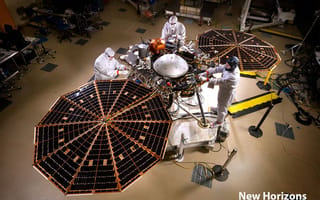
Last week, the Aerospace Corporation broke ground on a new, $100 million research and development center in Colorado Springs.
The nonprofit’s $100 million office expansion represents more than just a hole in the ground, said Vicky Lea, director of aerospace and aviation at the Metro Denver Economic Development Council (EDC), which runs the Colorado Space Coalition. The California company’s physical growth in Colorado, along with its 200-person hiring spree, is the latest example of a sector that has continued to flourish in Colorado despite the economic downturn caused by the COVID-19 pandemic, she said.
“This summer has actually been the busiest in terms of interest, with national and international aerospace companies considering Colorado as the place to establish their U.S. footprint,” Lea told Built In.
Colorado’s lax regulatory environment, single-factor tax (and low corporate tax rate), affordable cost of living, airport connectivity and existing technology ecosystem have long made the area a beacon for entrepreneurs interested in the intergalactic. Now, a proposal to bring a new space station — and an estimated 1,400 jobs — could drive even more growth in the industry space.
The Background
Over the past five years, job growth in Colorado’s aerospace industry has outpaced the national average by 10 percent, according to the EDC, with the state leading the nation in holding the most private aerospace jobs per capita.
In 2019, 280 aerospace companies employed more than 30,000 software engineers, applications developers and business operations specialists in Colorado, with the total number of industry jobs growing 7 percent year over year. While nine of the nation’s 10 major defense contractors are located in Colorado, startups with fewer than 10 employees comprise the majority, or 64 percent, of Colorado’s aerospace industry. Small companies like Deep Space Predictive and Blue Foot Engineering have long called Colorado home.
While the EDC has not yet finished crunching numbers for this year, Lea said it’s safe to say that job growth and investment in Colorado’s aerospace industry has not slowed. Lea credited the industry’s continued growth to the Department of Defense and NASA’s budgets remaining constant despite the economic downturn. A NASA report released in late September found that the agency contributes $4.5 billion each year to the Colorado economy. This year, many local companies have also made good on hiring promises announced in 2019, she said.
“We’re not seeing any signs of a downturn,” Lea said. “We’re cautiously optimistic that we will actually see positive employment growth this year.”
To Infinity and Beyond
Colorado officials want to keep the aerospace industry booming.
Two local towns are currently in the running to house the U.S. Space Command, the national military coordination hub for all things space. Once complete, the EDC expects the Space Command to bring 1,400 jobs and generate $1 billion in economic development. Lea added that the public site will also generate private interest.
“It would help us to further attract businesses, companies to Colorado, because of the proximity to the headquarters of U.S. Space Command,” she said.
The Space Command is temporarily operating out of Peterson Air Force Base in Colorado Springs, which also represents the location of the nation’s first military space domain. Colorado Springs was named the temporary location for the organization in 2018 and, the following year, was one of six national finalists the federal government was considering for the permanent site. Back then, it seemed like the Trump administration was keen on Colorado — four of the six finalists were located in the state.
But then in May, the Air Force heads seemed to have a change of heart. The federal government announced that it was opening its search up nationwide again, and said Colorado Springs would temporarily house the facility for six more years.
“Florida was disappointed not to be selected as a finalist, so there’s definitely been a degree of political pressure,” Lea said, when asked why the government opened the search up again.
Now, about 28 different cities across the United States are vying to hold the site, she said. The EDC has helped Colorado’s two contenders — Aurora and Colorado Springs — crunch numbers and compile their applications, offering each an undisclosed amount of financial support for each effort, Lea said. She said the EDC is “location agnostic” for where they prefer Space Command to be located — “We just want it here in Colorado,” she said — and expects the feds’ revised finalist list will be released in November, after the presidential election.
“Colorado is a natural home for the U.S. Space Command headquarters,” Lea said. “From a historical perspective, the fact that it’s already the huge concentration of military space assets, but also the whole private commercial space sector here in Colorado, we’ve got it all.”




